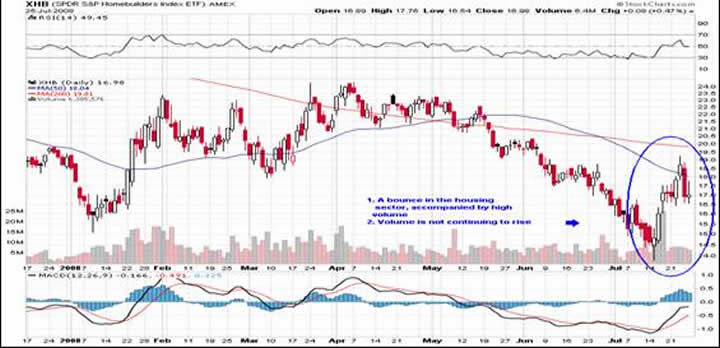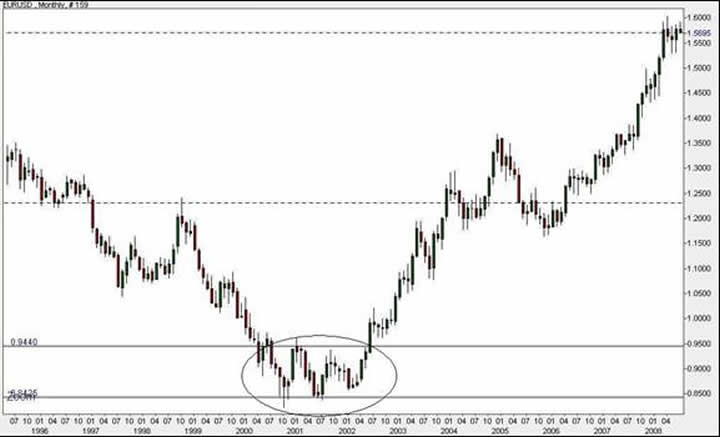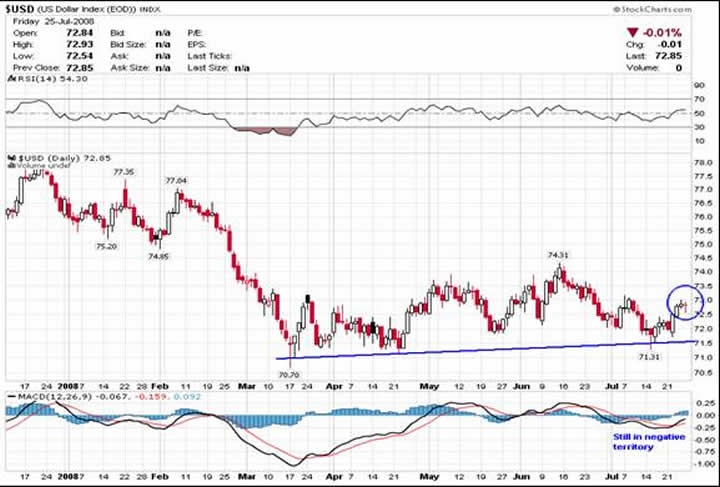Have the Stock Markets Reached a Bottom?
Stock-Markets / US Stock Markets Jul 27, 2008 - 07:55 AM GMTBy: Adam_Perl

 The financial markets bounced back and forth last week, affected by a wave of economic data and earnings from a few of the largest names in the U.S market. The biggest surprise came out on Friday as the housing sector showed that it still has some fight left in it, with new and existing home sales - beating analyst's estimates. As the housing crisis is one of the major causes of the current economic situation, it is only legitimate to think that if the current housing crisis improves, the economy will regain its strength, heading back on track. Then again, is this a valid conclusion or only wishful thinking?
The financial markets bounced back and forth last week, affected by a wave of economic data and earnings from a few of the largest names in the U.S market. The biggest surprise came out on Friday as the housing sector showed that it still has some fight left in it, with new and existing home sales - beating analyst's estimates. As the housing crisis is one of the major causes of the current economic situation, it is only legitimate to think that if the current housing crisis improves, the economy will regain its strength, heading back on track. Then again, is this a valid conclusion or only wishful thinking?
To date, the housing sector is continuing to show mixed signals: on one hand, we are seeing government officials trying to stabilize mortgage finance giants like Fannie Mae and Freddie Mac, improved new home sales and high interest in the housing sector by investors. On the other hand, U.S. foreclosure filings more than doubled in the second quarter compared to the same time period last year, as falling home prices left borrowers owing more on mortgages than their properties are worth. In addition, high volume that accompanied the bounce in the housing sector a week ago, doesn't seem to be following through.

*courtesy of stockcharts.com
Even though stock markets and different financial sectors are rising, it doesn't mean that sentiment is back on track. Until the markets receive a clear direction about the current financial and housing crisis, traders shouldn't be surprised if current bullish attitude loses its strength following upcoming data.
In addition, one has to remember that another problem still remains: the US Dollar. While the dollar managed to regain some strength this week, true dollar continuous strength will only occur following a change in monetary policy: rising interest rates fighting increasing consumption.
This leads us to an additional question; is consumer consumption back on track?
This week, GDP results in the U.S are going to be released. GDP is an equation, among others, of the outcome of personal spending and government spending; therefore even if GDP results exceed market expectations we have to ask ourselves who is causing the growth - government spending trying to stimulate the economy or consumer consumption, representing a healthy economy.
During uncertain times consumers tend to allocate more of their disposable income to personal savings rather than consumption, out of fear that the worse of the economic slowdown is yet to come. Examining the USD/JPY one can see that the dollar started to rise solidly against the Japanese Yen only in 2004, one year after the 2001-2003 recession. This was caused by rising interest rates, trying to control a healthy economy from racing to far forward.
Analyzing the currency market further, one can see on the chart below that the EUR/USD range-traded throughout the whole of the 2001-2003 period, breaking range only when the European economy started to head back on track, stimulated by global economic strength.

*courtesy of netdania.com
Similar to that period, the EUR/USD has been consolidating since the end of February, waiting for the first central bank to draw its guns, in hope that they will change their monetary policy, and continuously raise interest rates to fight economic growth, and not just a one off rate hike.
While it seems that the markets have touched a bottom, investors should continue to be cautious, as indices could test recent lows and individual currency pairs could continue to range, especially as uncertainty is still lingering in the air and consumer consumption is not yet back at full speed. Friday's candle on the dollar index is a fine example of the uncertainty, closing the week with a Doji candlestick.

*courtesy of stockcharts.com
By Adam Perl
I am a currency strategiest, I have over 6 years of personal experience trading stocks on the American stock exchange and the Foriegn Exchange. I am also a private trader and coacher for the financial markets. I am also launching a website over the summer.
Information reliability and liability : The contents are solely aimed for the use of "Experienced" investors in the financial markets who are fully aware of the inherent risk of trading. I, “Adam Perl”, do not accept any liability for any loss or damage whatsoever that may directly or indirectly result from any advice, opinion, information, representation or omission, whether negligent or otherwise, contained in our trading recommendations. I make no warranties or representations in relation to the Information (including, without limitation, in relation to its accuracy or otherwise) and do not warrant or represent that the services will be error free or uninterrupted.
Copyright : This article is subject to and protected by the international copyright laws. Use of the information brought in this article is subject to making fair use only in accordance with these laws. It is not permitted to copy, change, distribute, or make commercial use of the information except with permission of the holders of the copyright.
Risk Disclosure : The risk of losses involved in the transaction or speculations in the financial markets can be considerable. Please think carefully whether such trading suits you, taking into consideration all the relevant circumstances as well as your personal resources. Speculate only with funds that you can afford to lose.
Adam Perl Archive |
© 2005-2022 http://www.MarketOracle.co.uk - The Market Oracle is a FREE Daily Financial Markets Analysis & Forecasting online publication.


